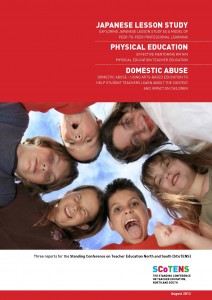Project Aims
This project aims to explore the role of primary education in the teaching of political history, with particular emphasis on teaching contested or controversial history in the context of the decade of commemorations
Project Aims
This project aims to explore the role of primary education in the teaching of political history, with particular emphasis on teaching contested or controversial history in the context of the decade of commemorations
To project held a conference which took place in May 2013 in the School of Education in UCD for doctoral students in education on the island of Ireland. This was the fifth Doctoral Conference that SCoTENS co-funded.
All Ireland Doctoral Student Research Conference Report
Project Aims
The Programming Studio, a virtual learning environment hosted by QUB will offer a pilot group of post-primary school ICT teachers an opportunity to experience programming as a ‘digital literacy’ by mastering the programming language(s) identified above through games-based learning. The wider skill of ‘computational thinking’ at the heart of computer programming will be embedded in the Programming Studio game plan.
Project Aims
This project aims to examine the interaction between Pedagogical Content Knowledge (PCK) and school and classroom setting with a view to identifying the factors that support or inhibit teachers in the implementation and development of the methodologies and approaches introduced during ITE
This study seeks to explore the use of Research Lesson Study (RLS), a long -established professional development strategy in Japan, as a model of school-based and peer-to-peer professional development for teachers which is new to Northern Ireland and the Republic. Broadly stated, RLS involves between 3-5 teachers forming a group that plans lessons, observes them being taught by each other and analyses them with a view to improving practice. There are various approaches to RLS but this proposal seeks to adapt the successful work of Dudley (2005), which was arguably the first formal application of RLS techniques for professional development anywhere in Ireland or the UK.
-established professional development strategy in Japan, as a model of school-based and peer-to-peer professional development for teachers which is new to Northern Ireland and the Republic. Broadly stated, RLS involves between 3-5 teachers forming a group that plans lessons, observes them being taught by each other and analyses them with a view to improving practice. There are various approaches to RLS but this proposal seeks to adapt the successful work of Dudley (2005), which was arguably the first formal application of RLS techniques for professional development anywhere in Ireland or the UK.
The focus of this small-scale study is to examine this relatively new professional learning tool in a secondary level school in Sligo and Belfast. The key research questions are:
Professor John Gardner, Queen’s University Belfast
Mr Gerard Devlin, Queen’s University Belfast
Dr Debie Galanouli, Queen’s University Belfast
Dr Mary Magee, St Angela’s College, Sligo
Ms Kathryn McSweeney, St Angela’s College, Sligo
The aim of this research project is to:
Dr Fiona C Chambers, University College Cork
Mr Walter Bleakley, University of Ulster at Jordanstown
Dr Deirdre Brennan, University of Ulster at Jordanstown
This research project will undertake an audit in the participating institutions to identify the extent to which the topic of domestic abuse is included in the undergraduate education curriculum. Results from the audit will be used to inform the development and evaluation of a tailored education programme with student teachers. The aim of the education programme is to increase student teachers knowledge and understanding of domestic abuse and the impact it has on primary school aged children’s learning, development, behaviour and relationships within an educational context. The use of actors in the education programme provides an opportunity to address real life situations in a safe environment.